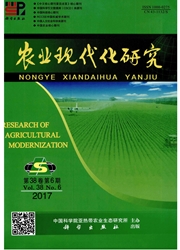

 中文摘要:
中文摘要:
基于行为经济学前景理论,本文运用河南养殖主体调研数据和二元Logistic模型,研究了生猪价格波动背景下养殖主体决策行为的影响因素。结果表明:1)养殖主体在内部和外部因素的共同约束下进行“有限理性决策”,在盈利前景和亏损前景下其决策行为的影响因素不同,具有非对称特征;2)在盈利前景下,养猪专业化程度对养殖决策行为有负向影响,政策满意度有正向影响;3)在亏损前景下,经济状况、是否参加生猪养殖保险、获取生猪价格信息难易程度对养殖决策行为有负向影响,风险偏好、政策满意度有正向影响。平抑“猪周期”,关键在于养殖主体在价格波动背景下决策行为的选择,因此,提升养猪组织化程度、开发多元化生猪养殖保险产品、完善生猪交易信息化服务平台、调整生猪产业政策体系,有助于提高养殖主体决策水平,促进生猪产业健康发展。
 英文摘要:
英文摘要:
Based on a survey data in Henan Province and applying the prospect theory and the binary logistic model, this paper analyzed the influencing factors of decision-making behaviors in the hog breeding industry under the background of the hog price volatility. Results show that: 1) hog breeders make bounded rational decisions subject to both internal and external constraints. The influencing factors are different and show asymmetric features when examined from both gain prospect and loss prospect; 2) from the gain prospect, the degree of specialization about hog breeding has some negative effects on the decision-making behaviors of hog breeders, whereas the satisfaction with government policies has some positive effects; and 3) from the loss prospect, economic status, insurance on the hog breeders, and the easiness of obtaining price information from hog markets have some negative effects on the decision-making behaviors of hog breeders, whereas risk preference and satisfaction with government policies show some positive effects. To control the hog price cycle, the key is to understand breeders’ decision-making behaviors. Therefore, to improve decision-making behaviors of hog breeders and to the maintain a stable development of the hog industry this paper provides the following suggestions: promoting coordination within the hog breeding industry, developing diversified insurance products for the hog breeding industry, perfecting the information service platform of hog transactions, and adjusting the policy system related to the hog breeding industry.
 同期刊论文项目
同期刊论文项目
 同项目期刊论文
同项目期刊论文
 期刊信息
期刊信息
